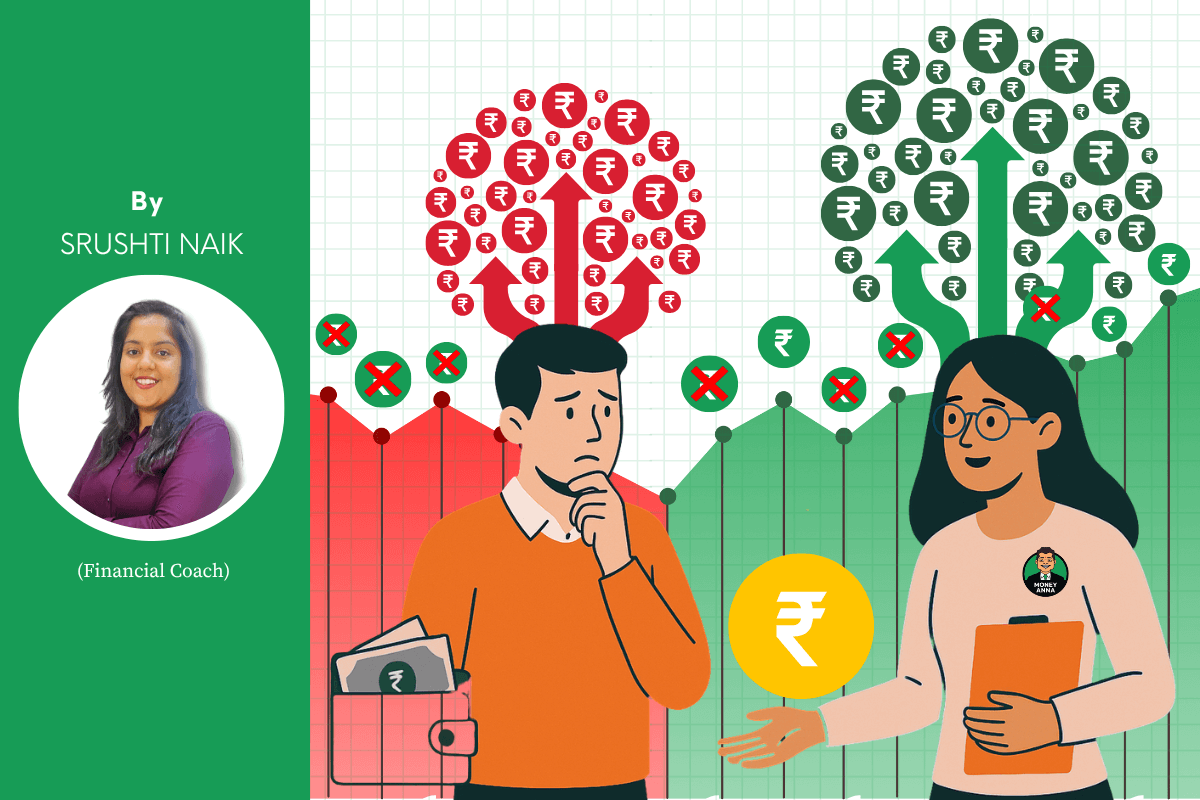What’s in the blog?
This blog provides a simple breakdown of what behavioral finance really means. You will understand why your money decisions aren’t always as logical as you think. We explain how emotions, habits, and biases can affect wealth creation and what you can do to stay on track.
“Are you logical with your money?” I ask this to almost every client on their first visit, and the answer is almost always yes. With a big smile, I start digging in a little deeper, and every time we reach the same conclusion – Our emotions control our wallets more than we realize.
We plan to start saving or investing, but somehow, the timing is never right. A weekend sale, a new gadget launch, an unexpected vacation plan—something always comes up. In fact, most of my clients tell me they’ve been planning to meet me for months before they finally take action.
But why does this happen?
To understand that, we need to explore an interesting concept called behavioral finance.
What is Behavioral Finance?
In the simplest terms, behavioral finance is the study of why we make money decisions that aren’t always logical.
Unlike traditional finance, which assumes people think rationally, behavioral finance admits the truth—we don’t. We get emotional, we make impulsive decisions, and sometimes, we sabotage our own financial future without realizing it.
Why do we panic-sell stocks when the market drops?
Why do we struggle to save, even when we know it’s important?
Why do we buy things we don’t need, just because they’re on sale?
Because money isn’t just about numbers—it’s about psychology.
Let’s try to visualize this –
You step into a mall to buy a pair of shoes. An hour later, you walk out with a luxury watch, a designer backpack, and a random gadget you’ll probably never use. You swipe your card and tell yourself, “It’s fine, I deserve this.”
This, my dear readers, is behavioral finance in action. But, the good thing is that we aren’t helpless. If we understand how our mind plays tricks on us, we can take control of our financial future.
Why Does it Matter in Wealth Creation?
Earning money and building wealth are two very different things. Wealth creation requires discipline, conscious decisions, and smart money habits. If emotions, instead of logic and strategy, wealth will always slip through your fingers.
Whether it’s FOMO, greed, impulsiveness, or the ‘I deserve it’ mindset, emotional spending can hold you back. That’s why understanding behavioral finance is important—it helps you take control, make smarter choices, and build lasting wealth.
Most people think wealth creation is about how much you earn, but in reality it’s about how you manage what you earn. Even high-income earners struggle financially if they fall into psychological traps that drain their money. Let’s look at four major money traps and how they impact wealth-building.
The Instant Gratification Trap - Spending Now vs. Saving for Later
You might have heard about the ‘Marshmallow Test’. Researchers placed a marshmallow in front of kids and told them, “You can eat this now, or wait 15 minutes and get two.” Most kids couldn’t resist. They grabbed the marshmallow right away and lost the chance to get a second one.
Now, replace that marshmallow with your salary.
If you spend every rupee on short-term pleasures—expensive coffee, shopping sprees, impulsive online purchases—you won’t have anything left to invest.
The secret to creating wealth? Train yourself to wait for the second marshmallow. Start saving, start investing, and let your money grow. Future you will thank the present you.
The Emotional Investing Trap - Acting on Feelings Instead of Strategy
When the stock market is booming, people jump in, afraid of missing out. When it crashes, they panic-sell everything.
This is the fastest way to lose money.
Think of investing like planting a tree. You don’t dig it up every time the weather changes, right? You let it grow. Wealth builds over time. Ignore the noise, stay patient, and keep investing consistently.
The Mental Bias Trap - How Your Brain Tricks You into Losing Money
Your brain has built-in biases that make financial decisions tricky. Some of the biggest ones are:
- Herd Mentality – Investing in something just because everyone else is (Bitcoin at ₹50 lakh? NFTs?).
- Loss Aversion – Feeling the pain of losing money more than the joy of gaining it, making you too scared to invest.
- Overconfidence – Thinking you can predict the market (Spoiler: No one can).
The "I’ll Start Later" Trap – Missing on the Power of Compounding
Meet two friends, Ramesh and Suresh.
- Ramesh starts investing ₹5,000/month at 25.
- Suresh waits until 35 but invests ₹10,000/month.
Who has more money at retirement? Ramesh.
Why? Because time beats money. The earlier you start, the more your wealth multiplies.
The biggest mistake? Thinking, “I’ll start investing later.”
Later becomes never. Start today, even if it’s just a small amount.
My Take
Understanding behavioral finance is like getting a cheat code for managing money. The next time you’re about to make a financial decision, ask yourself:
“Is this a smart money move, or just my emotions talking?”
Master your mind, master your money. Small changes today can build massive wealth tomorrow. And remember—wealth isn’t built overnight, but every overnight counts.




